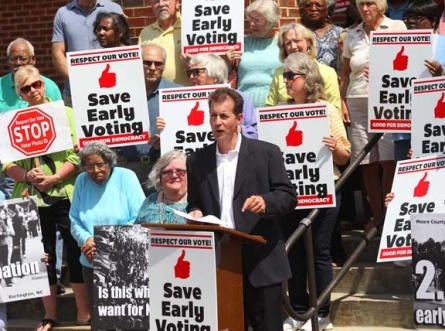The right to (not wait to) vote

In the 2012 elections, Florida made headlines with reports of problems at the polls, most notably long lines that caused voters to wait six hours or more to cast a ballot.
A commonly mentioned culprit in Florida's voting headaches was state House Bill 1355, a measure championed by the state's Republican leadership that, among other election changes, slashed the number of early voting days from 14 to eight.
After all the bad press, many Florida Republicans reversed course: Weeks after Election Day, the state's former GOP chair lambasted the early voting restrictions, saying Republicans had only voted for them because "they firmly believe that early voting is bad for Republican Party candidates." Early in the 2013 session, House Republicans voted 118-1 in support of a bill that restored Florida's early voting time.
This spring, lawmakers in other Southern states are signaling they want to curb early voting. But after the Florida fiasco, and given early voting's popularity, is there any chance they will succeed?
In both North Carolina and Texas, bills have been floated by Republican lawmakers that would cut early voting days. In North Carolina, the attack on early voting is one of several measures being pushed that limit voting access, including a photo voter ID requirement and eliminating same-day registration during early voting. Another proposal would cut a $2,500 tax credit for parents of a child who registers to vote where he or she attends college.
Of the voting changes, curtailing early voting seems the most likely to provoke a backlash from voters. Early voting is immensely popular: In 2012, 2.5 million North Carolinians voted early, or about 57 percent of those who cast ballots.
Evidence is also mounting that long lines at the polls -- the chief problem early voting has been designed to address -- have disproportionate impact on Democratic voters, which fuels suspicion that the measures have partisan intent.
For example, a study released this month by Charles Stewart III at the Massachusetts Institute of Technology drawing on election surveys found that race was the biggest factor in voting wait times: Nationally, "African Americans waited an average of 23 minutes to vote, compared to 12 minutes for whites; Hispanics waited 19 minutes."
Stewart is careful to emphasize that the exact cause of long wait times is unknown. His paper also finds that urban areas tend to have the longest waits. And states in the South lag behind the rest of the country: Ten of the 20 states with the longest reported wait times in 2012 were in the region, which may point to larger problems with election funding and policies in Southern states.
But another paper by Michael C. Herron and Daniel A. Smith, researchers at Dartmouth and the University of Florida, respectively, looked at the impact of shortened early voting hours due to House Bill 1355 and concluded, "[T]he voting rights of racial and ethnic minorities appear to have been disproportionately hampered by HB 1355's reduction in the number of early voting days."
The bipartisan support for early voting, coupled with perceptions that efforts to curtail it are driven by partisan motivations, have fueled rallies in towns across North Carolina. In early April, a local Florida election supervisor, Ion Sancho of Leon County, testified at an N.C. House elections committee hearing that cutting early voting in his state was a "nightmare," and that to do so in North Carolina would be a mistake.
In the face of such growing opposition, Republican leaders appear to be having second thoughts. In a recent interview with Raleigh's News 14, N.C. House Speaker Thom Tillis -- from Mecklenburg County, the kind of densely urban area that could be most disrupted by cuts to early voting -- appeared to backpedal from his colleagues' measures, saying:
"I think that early voting is a good thing. The question about whether we should have consistent days and times across the state is a valid question and I’m sure people will ask about that, but I don’t see a significant ratcheting back of the number of days available for early voting."
Tags
Chris Kromm
Chris Kromm is executive director of the Institute for Southern Studies and publisher of the Institute's online magazine, Facing South.
